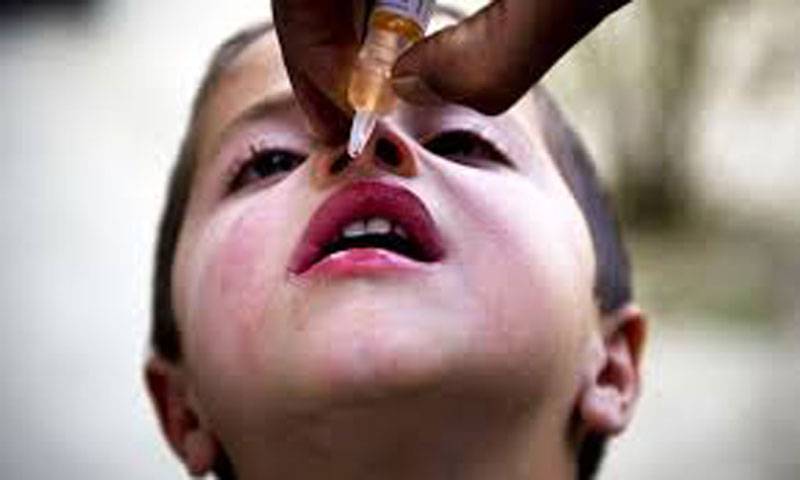Islamabad - The Khyber Pakhtunkhawa during the third national polio campaign of the year 2015 recorded 16,864 parental refusals, the highest number as compared to other provinces and territories.
After KP in Sindh 10,428 children missed polio drops, Balochistan 4,911, Federally Administered Tribal Areas (FATA) 853, Punjab 608, Azad Jammu and Kashmir 31, Gilgit-Baltistan 0 as parents refused to vaccination teams to administer polio drops to their children.
According to officials, the ratio of religious refusals has declined to a great extent due to efforts of the Health Ministry after engagements of Ulema, community elders and Imam-e-Kaba and now refusals are due to campaign fatigue and potential threats from Taliban as they had imposed a ban on polio vaccination. “In KP almost all the refusal cases are clustered in Bannu and Lakki Marwart, they added.
The National Immunisation Days (NIDs) held on March 16-18, 2015 across the country except Quetta, Rawalpindi and Islamabad due to mobilisation of security forces for the March 23rd parade and some snow bound UCs aimed at vaccinating a target population of 34.7 million children below the age of five years.
In Rawalpindi the drive is now underway since March 24 and in Islamabad it will start from March 30. Three districts of Karachi have also been doing campaign in 2nd phase and their data will add to Sindh coverage.
As per data gathered from respective control rooms, 34,714,214 children were the target population to vaccinate against the polio and of them 33,638,274 children were reported to be vaccinated that account for overall 97 percent coverage. A total of 391,860 children ( 1.1 percent) remained unvaccinated in the campaign and of them 358,165 (1.0 percent) children were not available when the vaccination teams visited them and 33,695 (.10 percent) missed due to parental refusal.
The data also drew attention towards a striking fact that about 129,263 children were reported to have no dose of routine immunisation against 9 diseases, including polio. As many as 79,259 children missed doses of routine immunisation in Punjab, in Sindh 22,832, KP 11,078, Balochista 7,446, FATA 6,906, AJK 879 and G-Baltistan 863.
According to the Pakistan Demographic and Health Survey (PDHS) 2012-13 the overall immunisation coverage is merely 53.8 per cent in Pakistan whereas the population’s immunisation coverage, according to the World Health Organisation (WHO), should be at least 80 per cent.
The missed children are not left altogether but the data is forwarded to the specialised departmental teams consisting of influential, community and religious leaders, and social moblisers for further follow-up and immunisation, maintained Dr Rana Muhammad Safdar, National Emergency Operation Center (EOC) Coordinator. “Now the paradigm shift would be from the covered children to missed children and the National Emergency Action Plan on polio for year 2015 envisages zero number of missed children in the campaigns by the end of this year,” he claimed. So far 20 cases have been reported this year with KP 7, FATA 6, Sindh 4, Balochistan 3.
Meanwhile, at a meeting deliberations were made to finalise the National Emergency Action Plan on Polio for 2015.
Senator Ayesha Raza Farooq headed the meeting wherein the representatives of federal and provincial health departments stressed on reducing frequency of campaigns and improving routine immunisation service system in the country.
Dr. Noor Baloch, Secretary Health Balochistan, stressed that repeated campaigns have compromised the quality of polio campaigns in the province and in National Emergency Action Plan, focus should be on the quality campaign instead of quantity.
Advisor to Chief Minister Punjab on Health Khawaja Salman Rafiq suggested that priority list of high risk districts for 2015 should be revised and Rahim Yar Khan, D.G.Khan and Rajanpur should be designated as high risk areas due to ongoing circulation in north Sindh and Balochistan, increased migrant and mobile population movement from high risk areas and low EPI coverage compared to other part of the Punjab.
Dr Mazhar Khamisani, Project Director EPI, Sindh, shared that in Karachi staggered campaigns are being conducted. Sindh Polio Programme has requested for 700 security personnel to conduct synchronised polio campaigns in Karachi high risk UCs but despite several commitments, security personals still could not be deputed for polio team escorts.
Wednesday, April 17, 2024
KP ‘stands tall’ in polio refusal cases

Pride and hype as F1 roars back to China after Covid absence
10:36 PM | April 16, 2024
No let-up in Karachi street crime incidents
10:35 PM | April 16, 2024
Stock market today: Most of Wall Street weakens again as Treasury yields rise more
10:34 PM | April 16, 2024
Muslim K-popstar Daud Kim buys land to build mosque in South Korea
10:33 PM | April 16, 2024
Punjab Stadium unavailability derails National Challenge Cup 2023 Final Round
10:28 PM | April 16, 2024
Political Reconciliation
April 16, 2024
Pricing Pressures
April 16, 2024
Western Hypocrisy
April 16, 2024
Policing Reforms
April 15, 2024
Storm Safety
April 15, 2024
Democratic harmony
April 16, 2024
Digital dilemma
April 16, 2024
Classroom crisis
April 16, 2024
Bridging gaps
April 16, 2024
Suicide awareness
April 15, 2024
ePaper - Nawaiwaqt
Advertisement
Nawaiwaqt Group | Copyright © 2024





